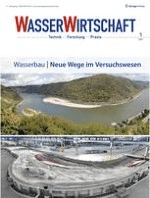
WasserWirtschaft
Scope & Guideline
Connecting academia and practice in water resource stewardship.
Introduction
Aims and Scopes
- Water Management and Policy:
The journal addresses contemporary issues in water management, including regulatory frameworks, policy implications, and the integration of environmental law in water usage. - Hydraulic Engineering and Infrastructure:
Focus on the design, construction, and maintenance of hydraulic structures such as dams, levees, and water treatment facilities, highlighting advancements in engineering practices. - Ecological and Environmental Considerations:
Research emphasizes the ecological impacts of water management practices, including biodiversity, habitat conservation, and the effects of climate change on aquatic ecosystems. - Technological Innovation in Water Management:
The journal explores the role of technology, such as AI and IoT, in enhancing water management efficiency, data collection, and predictive modeling for flood and drought management. - Sustainable Practices and Climate Adaptation:
Research promotes sustainable water management practices that adapt to climate change, focusing on resilience, water scarcity, and resource conservation.
Trending and Emerging
- Artificial Intelligence in Water Management:
Recent publications indicate a growing interest in utilizing AI for predictive modeling, data analysis, and enhancing decision-making processes in water management. - Climate Change Adaptation Strategies:
There is an increasing focus on research that addresses the impacts of climate change on water resources and the development of adaptive management strategies to enhance resilience. - Integrated Water Resource Management (IWRM):
A trend towards IWRM is evident, with an emphasis on holistic approaches that consider the interconnections between water, land, and ecosystems. - Biodiversity and Habitat Conservation:
Research exploring the impacts of water management practices on biodiversity and the importance of conserving aquatic habitats is gaining traction. - Community Engagement and Citizen Science:
Emerging themes include the role of community involvement and citizen science in water management, reflecting a shift towards participatory approaches in environmental governance.
Declining or Waning
- Conventional Hydropower Development:
As the focus shifts towards renewable energy sources and sustainability, traditional approaches to hydropower development, which do not incorporate ecological considerations, are becoming less prevalent. - Single-Focus Engineering Solutions:
There is a noticeable decline in articles that solely address engineering solutions without considering ecological impacts or interdisciplinary approaches, reflecting a broader trend towards integrated water resource management. - Historical Water Management Practices:
Research centered on historical practices and their relevance to modern water management is appearing less frequently, as the journal emphasizes forward-looking, innovative solutions.
Similar Journals
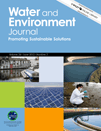
WATER AND ENVIRONMENT JOURNAL
Shaping sustainable practices through rigorous research.WATER AND ENVIRONMENT JOURNAL is a prominent interdisciplinary journal dedicated to the latest research and advancements in the fields of water resources, environmental engineering, and pollution management. Published by WILEY, the journal has established itself as an essential resource for academics, practitioners, and policymakers since its inception in 1987. With an impressive impact factor reflecting its robust influence, it ranks in the Q2 and Q3 quartiles across multiple categories, including Water Science and Technology, Environmental Engineering, and Management, Monitoring, Policy and Law. The journal welcomes high-quality research articles, reviews, and case studies that address the critical challenges facing water and environmental sciences. As an open access publication, it provides a platform for widespread accessibility and engagement, ensuring that the knowledge generated is disseminated to a diverse audience. With a commitment to advancing understanding and solutions in water-related issues, WATER AND ENVIRONMENT JOURNAL plays a crucial role in shaping the future of environmental research and technology.

Water Resources and Industry
Championing Evidence-Based Strategies for Water SustainabilityWater Resources and Industry, published by Elsevier, stands at the forefront of research in the critical fields of water science and technology, as well as geography, planning, and development. With an impressive 2023 impact factor that places it in the Q1 category for both Geography and Water Science on a global scale, this journal is a vital resource for academics, professionals, and students seeking to advance their understanding of water-related issues impacting industries worldwide. Since its inception in 2013 as an Open Access journal, it has fostered innovative research and practical solutions to challenges in water resource management. Located in the vibrant academic hub of Amsterdam, the journal encourages submissions that cover a broad spectrum of topics, from sustainable practices and policy development to technological advancements in water treatment and distribution. By making its research publicly accessible, Water Resources and Industry not only contributes to scholarly discourse but also empowers stakeholders to implement evidence-based strategies for water sustainability, thereby enhancing its relevance and impact in today's world.
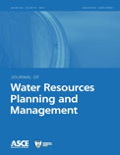
JOURNAL OF WATER RESOURCES PLANNING AND MANAGEMENT
Fostering Excellence in Water Resource Planning and PolicyJOURNAL OF WATER RESOURCES PLANNING AND MANAGEMENT is a premier publication within the fields of civil and structural engineering, geography, planning, and development, published by the esteemed American Society of Civil Engineers (ASCE). With an impressive impact factor and recognized as a Q1 journal across multiple categories, including Civil and Structural Engineering and Water Science and Technology, it serves as an essential resource for researchers, practitioners, and students engaged in the interdisciplinary study and management of water resources. Since its inception in 1980, this journal has evolved to address the increasingly complex challenges related to water management, reflecting innovative methodologies and robust research in policy and law, monitoring, and environmental science. While it currently does not offer open access, the journal ensures broad dissemination of its impactful findings, aiding in the advancement of knowledge and best practices in water resource planning and management. With its dedication to quality and rigorous peer review, JOURNAL OF WATER RESOURCES PLANNING AND MANAGEMENT stands as a critical platform for thought leadership in the effective stewardship of our vital water resources.

Hydrologie und Wasserbewirtschaftung
Connecting knowledge and practice in water resources.Hydrologie und Wasserbewirtschaftung, published by the BUNDESANSTALT GEWASSERKUNDE-BFG, stands as a vital open access journal in the field of hydrology and water management since its inception in 1999. Based in Germany, this journal aims to disseminate high-quality research related to water resources, environmental sustainability, and innovative management strategies. Though it has a Q4 ranking in Water Science and Technology for 2023, and holds a Scopus rank of 113 out of 225, the journal provides an essential platform for researchers, professionals, and students interested in advancing their understanding of water science. With coverage spanning from 1999 to 2018 and a seamless move to an open access model, Hydrologie und Wasserbewirtschaftung remains committed to contributing to the ongoing dialogue around critical water issues. Researchers looking to publish their findings or stay abreast of developments in water science will find this journal indispensable.
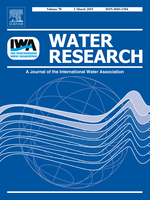
WATER RESEARCH
Empowering researchers to tackle urgent water issues.WATER RESEARCH, published by Pergamon-Elsevier Science Ltd, is a premier international journal dedicated to the advancement of knowledge in the interdisciplinary field of water science and technology. With a significant impact factor, WATER RESEARCH holds a distinguished position, consistently ranking in the top quartile (Q1) across multiple categories including Civil and Structural Engineering, Environmental Engineering, and Pollution. Established in 1967 and set to continue its legacy until at least 2024, this journal provides a vital platform for researchers and professionals to disseminate cutting-edge findings related to water sustainability, quality, and management. Although the journal follows a traditional access model, its commitment to disseminating impactful research ensures that it remains an essential resource for academia and industry alike. With a rigorous selection process, the journal includes articles that significantly contribute to the understanding and resolution of global water-related challenges, making it an invaluable asset for researchers, students, and practitioners engaged in this critical area of study.
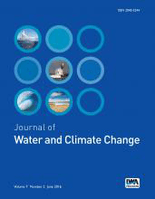
Journal of Water and Climate Change
Transforming Challenges into Opportunities in Water and Climate ScienceJournal of Water and Climate Change is a premier open-access journal published by IWA Publishing, dedicated to advancing the understanding of the interplay between water resources and climate change. With an ISSN of 2040-2244 and an E-ISSN of 2408-9354, this journal has established itself as a crucial platform for interdisciplinary research, publishing high-quality articles that address the challenges posed by climate variability on water systems globally. Since achieving open access status in 2021, the journal has fostered wider dissemination of knowledge among its audience, featuring works that span pivotal topics in Atmospheric Science, Global and Planetary Change, and Water Management. Notably ranked within the top quartiles in several relevant categories as of 2023, it occupies a vital position in the academic community, offering insights that are essential for policymakers, environmental scientists, and researchers striving to create sustainable solutions for water and climate challenges. Its commitment to excellence is reflected in its strong Scopus rankings, standing at the 66th percentile in Water Science and Technology and 65th percentile in Management, Monitoring, Policy, and Law. Located in the United Kingdom, this journal not only serves as a repository of cutting-edge research from 2010 to 2024 but also engages a diverse readership passionate about promoting sustainable water management practices.
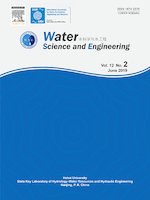
Water Science and Engineering
Empowering Research for a Water-Secure WorldWater Science and Engineering, published by ELSEVIER, is a premier open access journal that has been disseminating vital research in the realms of civil and structural engineering as well as ocean engineering since 2008. With its ISSN 1674-2370 and E-ISSN 2405-8106, this journal plays a crucial role in advancing knowledge and innovation within the sector, evidenced by its impressive rankings in Scopus—holding the 15th position out of 105 in Ocean Engineering and 76th out of 379 in Civil and Structural Engineering, placing it in the 86th and 80th percentiles, respectively. Attaining a Q1 classification in both categories for 2023 highlights its importance and influence in the academic and professional communities. The journal addresses a broad spectrum of topics integral to water sciences, offering significant insights for researchers, professionals, and students alike. With a convergence period spanning from 2010 to 2024, it continues to explore contemporary issues and advancements, providing a pivotal platform for the dissemination of research. The journal is accessible to a global audience, reaffirming its commitment to fostering open access and enhancing accessibility to vital scientific literature.
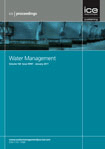
PROCEEDINGS OF THE INSTITUTION OF CIVIL ENGINEERS-WATER MANAGEMENT
Advancing Sustainable Solutions in Water ManagementPROCEEDINGS OF THE INSTITUTION OF CIVIL ENGINEERS-WATER MANAGEMENT is a prestigious journal published by Emerald Group Publishing Ltd, dedicated to advancing the field of water management within civil engineering. With an ISSN of 1741-7589 and an E-ISSN of 1751-7729, this journal delivers peer-reviewed research that spans the critical intersections of water science and technology, contributing valuable insights into sustainable water management practices. As evidenced by its ranking in the 2023 Scopus categories, where it holds the Q3 quartile in Water Science and Technology, and a respectable position among its peers, the journal remains a vital resource for researchers, professionals, and students in the field. Though it is not an open-access journal, it offers accessible subscription options that facilitate worldwide dissemination of knowledge, enhancing its role as a fundamental reference point for cutting-edge developments in water management. For those looking to publish or stay updated on the latest research trends, this journal serves as an essential platform for promoting innovation and sustainable practices in civil engineering and water resources management.
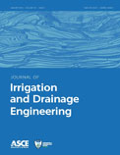
JOURNAL OF IRRIGATION AND DRAINAGE ENGINEERING
Pioneering Research for Sustainable Agricultural PracticesJOURNAL OF IRRIGATION AND DRAINAGE ENGINEERING, published by the ASCE - American Society of Civil Engineers, stands as a pivotal resource in the fields of irrigation and drainage engineering. With a rich publication history dating back to 1966 and continuing robustly through to 2024, this journal serves as a critical platform for disseminating innovative research and developments that contribute to effective water management practices. Catering to an audience of researchers, professionals, and students, it holds a notable impact factor within its categories, ranking Q2 in Agricultural and Biological Sciences (miscellaneous) and Q3 in both Civil and Structural Engineering and Water Science and Technology for 2023. This journal not only stimulates dialogue among experts but also addresses pressing global water challenges, promoting sustainable practices in resource management. Although it does not offer open access, the depth of its content and adherence to rigorous academic standards ensure it remains an essential citation for anyone involved in water resource engineering and the applied sciences surrounding agricultural efficiency.

Paddy and Water Environment
Bridging the gap between water science and sustainable agricultural practices.Paddy and Water Environment is a pivotal journal published by Springer Heidelberg, dedicated to advancing the fields of Agronomy, Environmental Engineering, and Water Science and Technology. Established in 2005, this esteemed journal focuses on the complex interactions between paddy cultivation and water management, addressing critical issues related to sustainable agriculture and environmental preservation. With an impressive performance in Scopus rankings—holding Q2 positions across multiple categories and showcasing a commendable publication impact—this journal serves as an essential resource for researchers, professionals, and students alike. Paddy and Water Environment provides insightful research articles, reviews, and case studies that contribute to the understanding of the intricate relationships between the environment and agricultural practices, promoting strategies for sustainable development. Subscribers benefit from access to a wealth of knowledge, underscoring the journal's significance in fostering scientific inquiry and innovation within its domain.